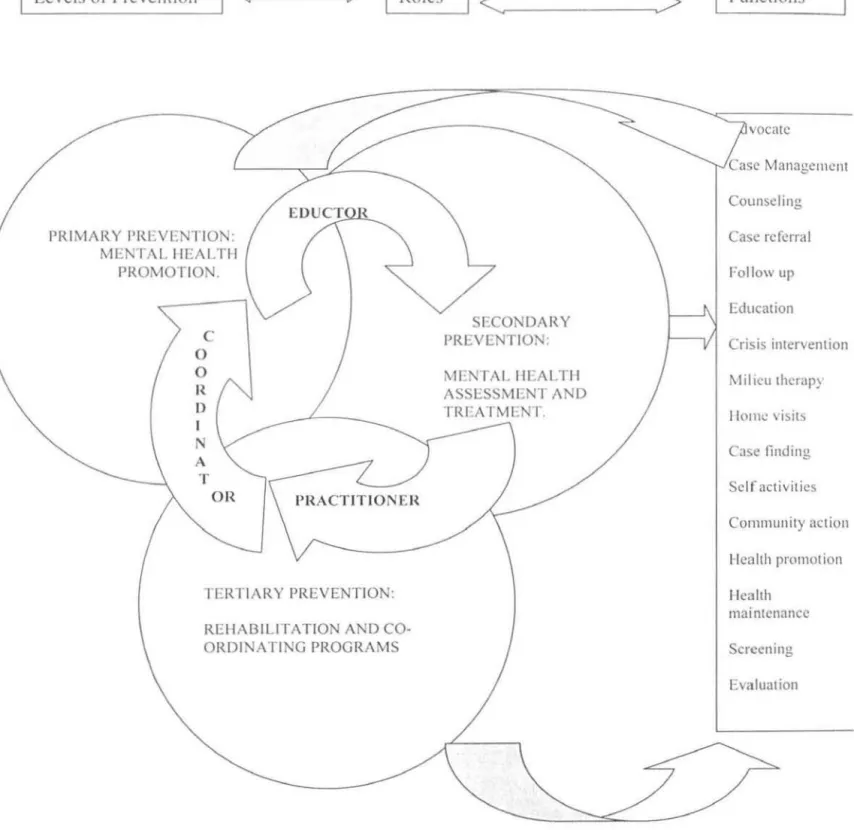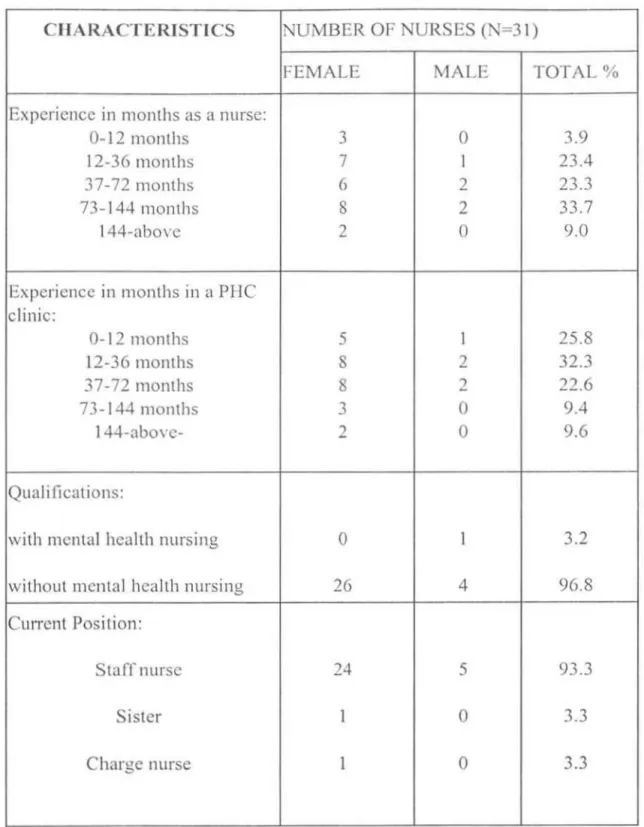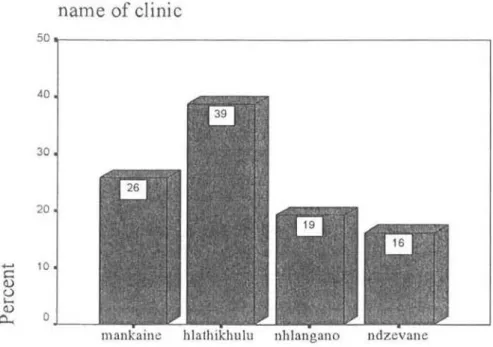The study aimed to investigate and describe the mental health care provided by nurses in Switzerland's primary care settings. A sample of 31 primary care nurses was used to generate data for the study. Mental health care, like the rest of the world, has undergone a lot of dynamics in recent years.
Furthermore, it seems relevant to explore the mental health care provided by these nurses in the primary health care systems. The purpose of the study was to examine and describe mental health care provided by nurses in selected primary health clinics in Swazilancl. The purpose of the study was to describe mental health care provided by nurses as: Practitioners.
RESEARCH QUESTION
C ONC EPTUAL F RAMEWORK
CHAPTER II LITERATURE REVIEW
CONCEPTUAL FRAMEWORK
Literature Review
- COMMUNITY PARTICIPATION
- PRIMAR)' HEALTH CARE
Sheppard (1991) reviewed community mental health work for social work and community psychiatric nursing practice. Community involvement in decision-making about community mental health care needs and programs is community participation. The study found that pmctice nurses play an important role in assessing, treating mental health problems and screening for depression.
Conce ptua l Framework
Most functions in the practitioner role as well as the coordination role fall under secondary prevention. Stanhopc and Lancaster (1999) support that nurses in the community are the key people who enable the achievement of the goals of PI-IC. They support that nurses as facilitators play a role of coordinator, educator and practitioner in the delivery of primary, secondary and tertiary care to individuals, families, groups and communities as a whole.
Practitioner: As a practitioner, the nurse helps clients maintain or regain coping skills that promote optimal functioning. In this role, the nurse is required to have the necessary skills to help her make accurate nursing diagnoses and manage mental health problems. Educator·: In the role of educator, teaching and learning principles are used to increase understanding or clients about the various dimensions of mental illness and mental health.
It is the basic strategy for the promotion and maintenance of community mental health care, as well as for the improvement or participation of the community, to help achieve community goals. Coordinator: As coordinators, nurses promote the health and well-being of clients. From this role, the nurse coordinator can assess the effectiveness of care.
Therefore, these roles and functions will be examined within the framework of mental health prevention.

CHAPTER III RESEARCH METHODOLOGY
The survey was seen as an appropriate technique for collecting data for research, as it is for descriptive studies (Burns & Grove, 1987). The study examined how nurses in PJ-IC clinics provided low-level health care (preventive, promotive and rehabilitative) in their roles as practitioners, educators and coordinators.
This enabled the individual nurse to describe his/her individual experience and thus reveal the actors involved in the provision of mental health care. In the study, the reliability and validity of the instrument was determined by administering the questionnaire twice to a group of 10 nurses in one of the clinics selected for the study. There was consistency in the responses in that there were no significant differences in the cross labs performed.
Letters requesting permission to carry out the study in the participating health clinics were sent to the responsible matrons (Appendix 4). Verbal permission was obtained from the nurses in the clinics participating in the data collection, the nursing staff were instructed not to write their names on the research instruments. All information was treated confidentially. He/she stated that data collected using interviews and questionnaires can per lair, for personal information (what the subjects do and did in the past), level of information about a particular topic and opinions.
The methods used to collect data in the study are appropriate, as descriptive data were needed to explain the means and types of activities that nurses performed as educators, implementers, and coordinators. After obtaining permission, PHC administrators or clinics informed the nurses about the research, and then a short meeting was held with the nurses who participated in the data collection to explain to them how to complete the questionnaire, its purpose and consequences. study. Concerns raised were addressed and each nurse was given time to complete the questionnaires in the privacy of their offices.
The metrics obtained included frequencies and percentages to describe activities performed by nurses in PHC clinics.
CHAPTER IV: PRESENTATION OF RESULTS AND DISCUSSION OF FINDINGS AND DISCUSSION OF FINDINGS
- SAMPLE DESCR IPTION
- GENDER AND YEARS 01' EX PERIENCE
- PROI'ESSIO NAL Q UA LIFI CATIONS AND POSITION HELD
- DISTRIBUTION 01' SAMPLE
- THEME I
- MENTAL J - JEAL TB CARE PROVIDED
- CATEGORY 11: PRIMARY MENTAL HEALTH EDUCATION
- THEME 3
- DISCUSSION OF THE FINDINGS ON PRIMARY MENTAL HEALTH CARE
- Descriptioll of Seco lldar y Melltal Health Care Provided
- CATEGORY I: THERAPEUTIC MENTAL HEALTH CARE
- T H EME I
- TH EME I
Mental health care provided within these levels is described in ten11S of specific functions of the nurse. The activities performed regularly include screening for mental illness by 19% of the nurses participating in the study, pr01110tiol1 of communication by 22.6%. None of the coordinator functions included in this study were identified by the nurses as some of the functions they did not perform in the PGS clinics.
Psychiatric services are inaccessible to the mentally ill clients as they have to tJ'm'cl over long distances to be attended. The results at this time revealed that the clinics did not provide any mental health care at this level, as evidenced by the responses of the nurses who do not participate in the activities of primary prevention, such as crisis prevention, problem solving, promotion of self-esteem, screening for mental illness and promotion of co1ll11llnication. Ebrahim and Ranken, (1988) further stated that problems related to the implementation of the PHC concept were rooted in each country's policies.
As a result of this disclosure by the clinic nurses, there is a continuous repetition of the themes "Male clients are not the primary clientele of the PHC clinics" and "primary mental health care is not the core function of the clinic nurses respectively. 110 evidence of the coordinating role that nurses played in the study, which some or nurses in the clinics worry most of the time when there is a client who presents them with a mental problem.
These were mainly identified by the mental health nurse who offered mental health care in the municipality.

THEME I
CHANGES IN STAFFING AND CURRICULUM CAN IMPROVE MENTAL HEALTH CARE PROVIDED BY PHC NURSES. The results revealed that the nature and mode of mental health care delivery was influenced by various issues related to the number of mentally ill clients within the community, poor lines of communication and the increased incidence of HIV/AIDS infection in the country. As nurses are the cornerstone or all PHC services, improving them would also ensure improved care at this level.
CHAPTER V CONCLUSION AND RECOMMENDATIONS RECOMMENDATIONS
CONCLUS ION
The outcome of the leading factors for mental health care, in turn, has a direct impact on the development of mental health care. The type of care provided in Swa/Iland's PHC clinics, both in Third World and WHO-McBCR countries, has come under heavy scrutiny by the WHO, as evidenced by the literature reviewed in the study (WHO, 1999). The study's statement that global health is not part of PHC clinics leaves primary mental health care non-existent across the country.
There is a need to strengthen the services offered so that the country can come on par with other Member States (Abiodull, 1990; WHO, \999). This will not be achieved unless structural changes and the internationalization of the values of the adopted healthcare system are explored.
RECOMMENDATIONS
1979) Community Mental Health: Issues for Social Work Practice and Education Washington: Council on Social Work Education, Inc. The role of the community nurse in mental health care in Botswana: the needs and problems of caregivers of schizophrenic clients in the community. Community nurse assessment of family care needs in Hong Kong caring for stroke patients.
National Development Strategy: A twenty-five year vision. Training for Transformation: Reorienting Primary Health Care for the Provision of Mental Health Care in South Africa Journal of Advanced Nursing. Mental health work in the community: theory and practice in social work and community psychiatric nursing.
ANNEXES
CONSENT
INTERVIEW GUIDE
UNIVERSITY OF NATAL
The study is on a partial afmy masters degree .. degree in mental health nursing which I am currently denying with the University of Natal. The aim or study is to describe the mental health care provided by nurses in primary health care clinics in Swaziland. Faculty or Community Development Disciplines llnd Sdlool e Nun~. I hereby request that a research study on "Mental health care provided by nurses in primary health care clinics in Sv.. Aziland" be carried out. The aim of the study is to describe the mental health care provided by nurses in primary health care clinics in Swaziland.
The aims of the study are to describe mental health care provided by nurses as. \ViII results are expected to contribute to the promotion of mental health care in the country and will therefore be forwarded to your institution in a timely manner. I am hereby requesting to carry out a research study on "1\ lent health care provided by nurses in primary care clinics in Swaziland".
The study is completed in panic with my maSler. degree III in mental health nursing which I am currently denying with the University of Natal. The aim of the study is to describe the mental health care provided by primary 111 nurses::. health care clinics in Swaziland. The objectives of the study are to describe the mental health care provided by nurses as. It is expected that the results will make a contribution to the promotion of mental health care in the country and will therefore be shared with your institution in due course.
It is expected that the results will contribute to the advancement of mental health care in the country and will therefore be shared with your institution in due course.
SWAZILAND GOVERNMENT
MEMORANDUM
